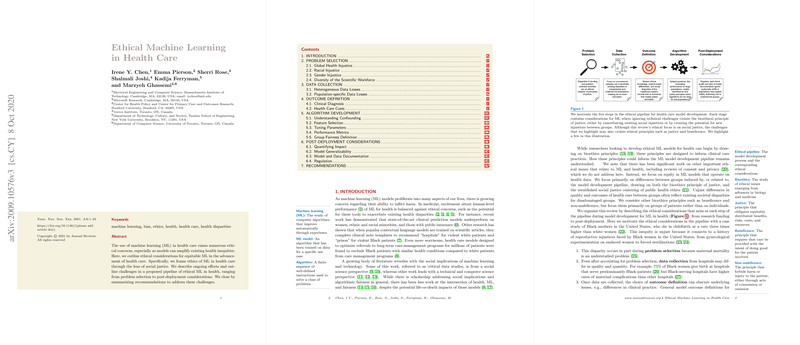Analyzing Ethical Machine Learning in Health Care
The research paper "Ethical Machine Learning in Health Care" by Irene Y. Chen, Emma Pierson, Sherri Rose, Shalmali Joshi, Kadija Ferryman, and Marzyeh Ghassemi provides a comprehensive exploration into the ethical implications inherent in the integration of ML into health care systems. The authors address how ML can potentially magnify existing disparities in health outcomes, particularly through the reinforcement of biases embedded in the data and ML models. This paper thoroughly investigates the stages of ML model development in health care from an ethical perspective, emphasizing social justice as the guiding frame.
Core Ethical Considerations in ML for Health Care
The paper critically examines the full trajectory of ML model development, highlighting five crucial stages: problem selection, data collection, outcome definition, algorithm development, and post-deployment considerations. Each of these stages is scrutinized with respect to its potential to either perpetuate or alleviate health disparities.
- Problem Selection: The authors argue that the questions prioritized by health care ML research often skew toward the needs of more advantaged groups, resulting in neglected health issues prevalent in disadvantaged populations. For instance, despite having significant disease burdens, low-income countries often receive markedly less research funding and attention.
- Data Collection: The authors delineate how biases can emerge during data collection due to population-specific data losses and heterogeneous data losses. Such losses can occur due to external factors like socio-economic disparities, leading to under-representative datasets that skew ML outcomes and predictions.
- Outcome Definition: The choice of outcome variables in ML models significantly affects the identification and perpetuation of health disparities. Inaccurate or biased definitions can lead to models that overlook sub-population nuances, hence misaligning predictions and interventions.
- Algorithm Development: The authors highlight the importance of algorithm choices, including feature selection and confounding management, which can inadvertently lead to models that reflect or exacerbate biases present in the training data.
- Post-Deployment Considerations: Effective audits and performance evaluations post-deployment are crucial. Without these, ML models run the risk of entrenched disparate impacts on different demographic groups, undermining equitable health care delivery.
Implications and Future Considerations
The paper underscores that deploying ML in health care should not only be approached as a technical exercise but also as an ethical mandate. Methodologies must be scrutinized for their potential to reflect social biases, and the academic lens should be broadened to consider the real-world impacts of these technologies on diverse populations.
The implications of this research are manifold. Practically, the findings challenge researchers and practitioners to integrate equity-focused metrics and audits regularly in ML pipelines. Theoretically, it opens up discourse on the social responsibility inherent in technological innovation, encouraging developments that are sensitive to the nuances of diverse health needs.
Recommendations and Future Directions
In their recommendations, the authors propose assembling diverse research teams and focusing on historically understudied health disparities as initial steps toward socially equitable ML in health care. They suggest strategies such as transparent data collection processes, reflective outcome labeling, and consistent ethical audits to help address these challenges.
Moreover, the paper points to the potential of ML to rectify biases within existing health care systems by facilitating equitable decision-making processes, provided that the models are conscientiously designed and rigorously evaluated.
Conclusion
The work by Chen et al. is a noteworthy contribution to ongoing efforts to ethically align ML development with the goals of fairness and justice in health care. By dissecting each component of the ML pipeline and examining its ethical considerations, the paper offers a valuable framework for future research and deployment strategies that prioritize an equitable health landscape. Future explorations in this field are encouraged to consider systemic injustices as central concerns, leveraging ML not only as a tool for innovation but as a mechanism for meaningful societal change.
